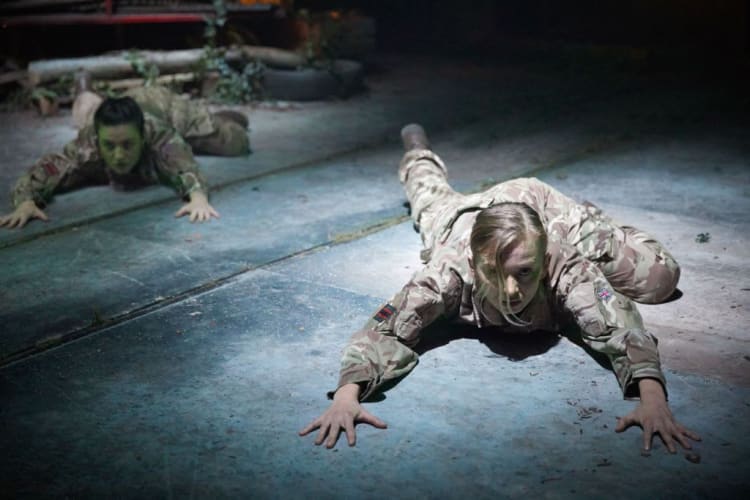In collaboration with Out of Joint Theatre Company, Sheffield Theatres presents a new play by Kate Bowen, her first full-length play to be produced.
Close Quarters refers to the imagined experience of three young women who have signed up for close-combat infantry duty in the British Army and find themselves in action on the Estonian border with Russia.
Two of the girls are close friends from working class backgrounds near Glasgow, the third a Welsh girl who has escaped the tedium of life as a farm labourer. All three are determined to prove themselves equal to the male squaddies they train and fight with.
Bowen shows awareness of the broader political context of the government’s decision to include women in fighting roles but is more interested in the individual women, their reasons for joining a close combat group, the prejudice they experience and their discipline and interdependence in a small fighting force.
In the small team, Sarah Findlay, played by Adiza Shardo, is intelligent, well-informed, cool under pressure and a natural leader. She copes with adverse comments by ignoring them and asserting a completely professional military persona. In contrast, her life-long friend Alison Cormack (Chloe-Ann Tylor), despite her outstanding physical fitness, is unable to suppress emotive responses to individuals or situations, which has exposed her to sexual harrassment and endangers the lives of her colleagues when she responds emotionally in action.
The third woman, Clare Davies (Sophie Melville), though apparently tough and aggressive also wavers under pressure, further threatening the success of the mission. In addition to the key female characters in the team, Lance Corporal Brian Armstrong (Dylan Wood), ostensibly in charge, lacks leadership qualities under pressure.
The remaining characters, the black Sergeant John Adeyemi (Bradley Banton) and Captain Anna Sands (Kathryn O’Reilly), now established as an effective female officer, bring other important perspectives to the action. Sands, particularly, points out that women cannot stand up to the physical rigour of the job over a period of years and urges the able Findlay to apply for officer training and go to Sandhurst.
The language of the play, which includes several dialects, is convincing and fast-moving. Scenes of mimed training, athletic gymnastics and action under fire punctuate the action and the scenes of actual combat are tense and exciting, revealing the strengths and weaknesses of the individual characters. Effective direction by Kate Wasserberg.
The play raises issues that will be recognisable to men as well as women who have gone through military training, the most important of which concern the absolute need for discipline, effective leadership, trust and interdependability. What this play also suggests is a prevailing culture which denigrates and humiliates women in uniform, with covert sniggering, hand gestures, bullying and exposure if there is a sexual encounter to reveal. Even Findlay, who is a successful and strongly committed recruit, eventually takes a path which will enable her to rise above all this.
